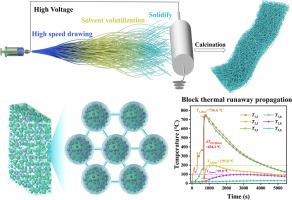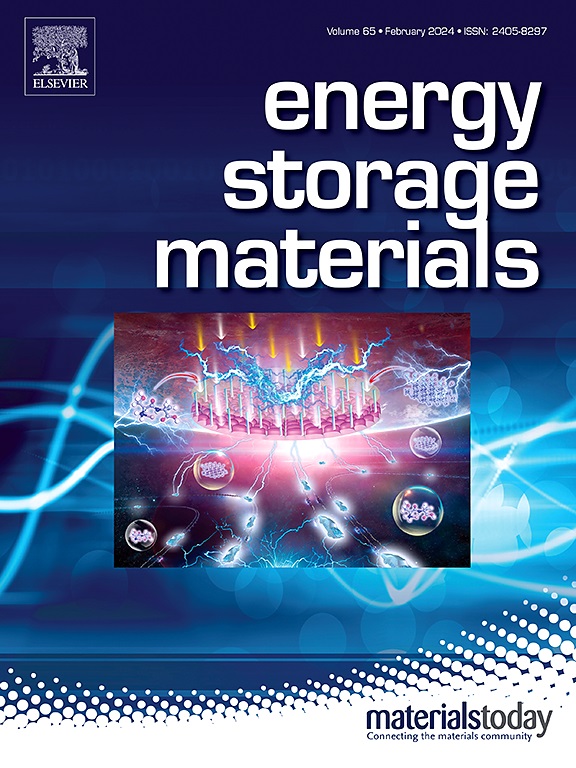Advanced ultra-pressure-resistant three-phase composite insulation: Halting thermal runaway in lithium-ion batteries
IF 18.9
1区 材料科学
Q1 CHEMISTRY, PHYSICAL
引用次数: 0
Abstract
Thermal runaway propagation (TRP) remains a critical barrier to the widespread adoption of lithium-ion batteries (LIBs). This study presents a novel composited insulation material that integrates nanofiber aerogel, particle aerogel, and robust microspheres to effectively mitigate TRP. Flexible mullite nanofibers (MNFs) are synthesized via a sol-gel method combined with electrospinning, with systematic investigations of the effects of aluminum-silicon ratio, spinning parameters, and polymer concentration on their properties. The resulting MNF mats exhibit ultralow thermal conductivity (0.0241 W/(m·K)) and exceptional thermal stability (-196 °C to 1300 °C). To further enhance the composite properties, hollow glass microspheres provide a robust mechanical support framework, achieving a compressive strength of 1.45 MPa, while specially modified aerogel particles significantly improve thermal insulation performance. Results show that increasing MNF content enhances mechanical strength and initially improves but later reduces thermal insulation performance. Tests on battery modules reveal that a 1 mm thick insulation material extends the average TRP time from 48.5 s to 1046 s, reducing the heat transferred to the adjacent battery from 198.34 kJ to 85.52 kJ. Remarkably, a 2 mm thick insulation layer completely blocks TRP, achieving a maximum temperature differential of 634.2 °C between the front and back batteries while lowering heat transfer to 59.71 kJ. This study overcomes the longstanding trade-off between mechanical performance and thermal insulation in conventional materials, presenting a scalable and effective design strategy for advanced insulation materials with broad application potential in LIBs.


求助全文
约1分钟内获得全文
求助全文
来源期刊

Energy Storage Materials
Materials Science-General Materials Science
CiteScore
33.00
自引率
5.90%
发文量
652
审稿时长
27 days
期刊介绍:
Energy Storage Materials is a global interdisciplinary journal dedicated to sharing scientific and technological advancements in materials and devices for advanced energy storage and related energy conversion, such as in metal-O2 batteries. The journal features comprehensive research articles, including full papers and short communications, as well as authoritative feature articles and reviews by leading experts in the field.
Energy Storage Materials covers a wide range of topics, including the synthesis, fabrication, structure, properties, performance, and technological applications of energy storage materials. Additionally, the journal explores strategies, policies, and developments in the field of energy storage materials and devices for sustainable energy.
Published papers are selected based on their scientific and technological significance, their ability to provide valuable new knowledge, and their relevance to the international research community.
 求助内容:
求助内容: 应助结果提醒方式:
应助结果提醒方式:


